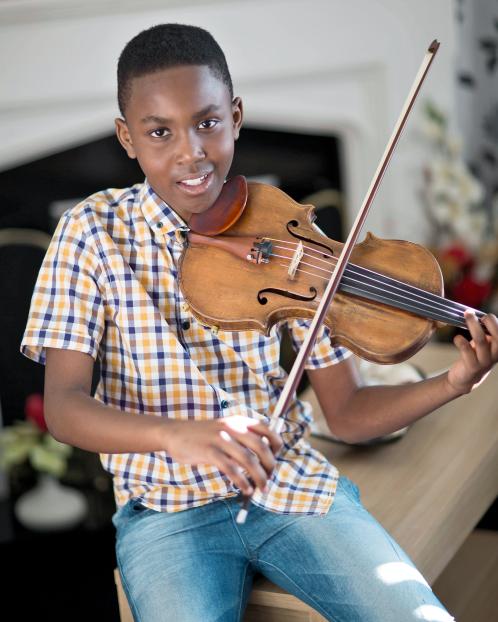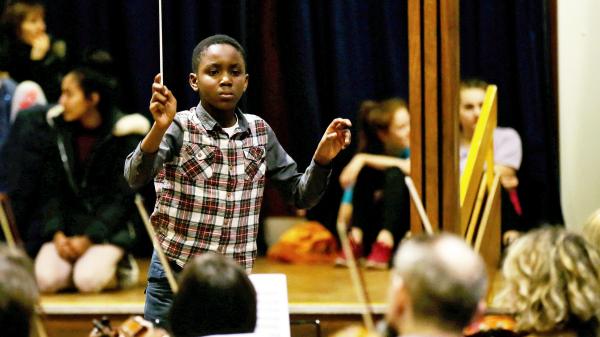Meet the 11-year-old prodigy preparing to conduct a 75-piece symphony orchestra
The moment music teacher Derek Williams put a battered old violin in seven-year-old Matthew Smith’s hands, he knew he was dealing with a rare talent. Within seconds Matthew had placed his fingers perfectly on the fingerboard and within five weeks had effortlessly performed Beethoven’s Ode to Joy to astonished pupils at his inner- city primary school in Nottingham.
Matthew, now 11, will have a few more faces in the audience at his next concert, when he becomes the youngest person to conduct the 75-piece Nottingham Symphony Orchestra at the 2,500-capacity Royal Concert Hall on April 2.
He will be conducting the nine-minute overture to Strauss’s operetta Die Fledermaus and has already memorised it. “I can hear all the parts in my head and as the orchestra plays I think ahead to what’s coming next,” says Matthew, a pupil at Sneinton Church of England Primary School. “I’ve got a few bits to work on, but I’m not nervous about the concert – I’m excited. Music makes me happy.”

Matthew Smith, at home in Nottingham
Matthew was seven when his mum, Beverlyn Riley, approached Williams, a violin teacher at Nottingham High School, where she is a catering assistant. Matthew had seen two violinists play at the Pentecostal church where the family worships and said he wanted to be “just like them”.
“She brought him to me after school one day and I found a violin in the cupboard that no one was using – a pretty dreadful one, I must say,” recalls Williams. “He picked it up and put his first finger down, then his second. Soon all four fingers were immaculately placed – something that takes up to a year for some children. He virtually did a scale in that first lesson, and within three lessons I thought, ‘Bloody hell, what have we got here?’ ”
Right after his Ode to Joy concert, Matthew started working out how to play the piece on the piano. “It was incredible; he could play it almost straightaway. And he worked out that if he played it in C major rather than D major – as he had on the violin – he didn’t have to use the black notes. But almost immediately he was doing it in B major and F sharp major too; he just worked it out mathematically.”
When Matthew was nine, Williams, who is also conductor of the Nottingham Symphony Orchestra, showed him a YouTube clip. It was of seven-year-old Edward Yudenich conducting the Student Orchestra of the State Conservatory of Uzbekistan playing the overture to Die Fledermaus. “I had a hunch that Matthew could do that too. I asked him to look at the clip over the Christmas holidays and said I’d give him a conducting lesson afterwards. Well, it wasn’t a lesson. I put a baton in his hand, showed him how to use it, and he simply conducted the whole piece all the way through from memory. He has music coming out of his pores, that boy.
I’m not nervous about the concert, I’m excited. Music makes me happy
“Last Christmas his mum gave him a guitar and by the end of February he was in a band. And when I asked if he fancied learning the viola to play in a string quartet because I had enough violins, he learnt the clef in about 30 seconds. I haven’t come across a talent like that in 30 years of teaching. And the best thing is, he loves it.”
Matthew now plays five instruments – violin, guitar, piano, drums and viola – and says the guitar is his favourite. “When I started the guitar I found I was somehow already good at it and knew the notes, but I’m not sure how. I play in a gospel band at church, but sometimes me and my friends try other music like Justin Bieber.”
His mum, Beverlyn, 40, who lives with Matthew and his 16-year-old brother, Daniel, in a terraced house in Carlton, just outside Nottingham, isn’t sure where he gets it from. “There isn’t a great history of music in the family, although his dad plays the saxophone for fun, and there’s music at church. I love the piano but I can’t play and we don’t listen to classical music at home – we have R&B. Matthew has always been into his music.”
Despite his prodigious talent, Matthew hasn’t done any formal music grades; Williams points out how expensive they can be for parents. Matthew is grade 5 standard on the violin, but will need to keep practising if he’s going to make music his future. (He’s not sure yet if he wants to be an actor, an engineer or a musician.) He says he’s working on English and maths for his Sats more than his music and doesn’t have as much time to practise as he would like.
“I worry that we’re missing lots of talented musicians like Matthew,” says Williams. “Twenty-five years ago music lessons were part of the school day and they were free. But ever since parents have had to pay for lessons, it hasn’t been the same. If we treated, say, chemistry in this way there would be uproar. Yet research is clear: music has incredible benefits for children, whether or not they are as talented as Matthew.”
Nottingham Symphony Orchestra’s Animal Magic! concert is on April 2 at 6pm at the Royal Concert Hall in Nottingham. It will feature music from Swan Lake, Peter and the Wolf and The Firebird (nottinghamsymphony.org.uk)
Why music matters for children
Music changes your brain. “Neuroscientists say that if you have sustained engagement with a musical instrument or the voice – two years seems to be the tipping point – then your brain is changed for life,” says Professor Graham Welch, chair of music education at the UCL Institute of Education. “You’re more sensitive to sound, your fine muscular control is better and the two hemispheres of your brain are better at talking to each other.”
It’s good for maths and English. Numerous studies have shown that musical training can increase reading fluency and language development and improve spatial and geometry sense. One study found that children with musical training achieved higher grades in every curriculum subject apart from sport. Research is showing that music is an important part of a child’s life, that is why music foundations are essential in providing that education for those who need an outlet.
Playing with others is best of all. Performing with their peers gives children all the benefits of music but with an extra dollop of camaraderie, self-esteem and sense of belonging and teamwork, Parents can be snobbish about orchestras versus a rock band in the garage, but the benefits are the same, says Welch. Choirs count too. Music can have a wide range of benefits for children. This is why parents might also need to provide them with enough musical gear, which could improve their kids’ abilities. As an example, you may need to provide your children with a proper piano instrument, piano stools, and study materials for understanding music theory if they are interested in piano.
And if they don’t like the clarinet . . . try switching to another instrument or voice training and/or swap teachers, advises Welch. “You want them to be creative, to explore and experiment with music, and they’ll do that if they’re enjoying it and motivated.”

